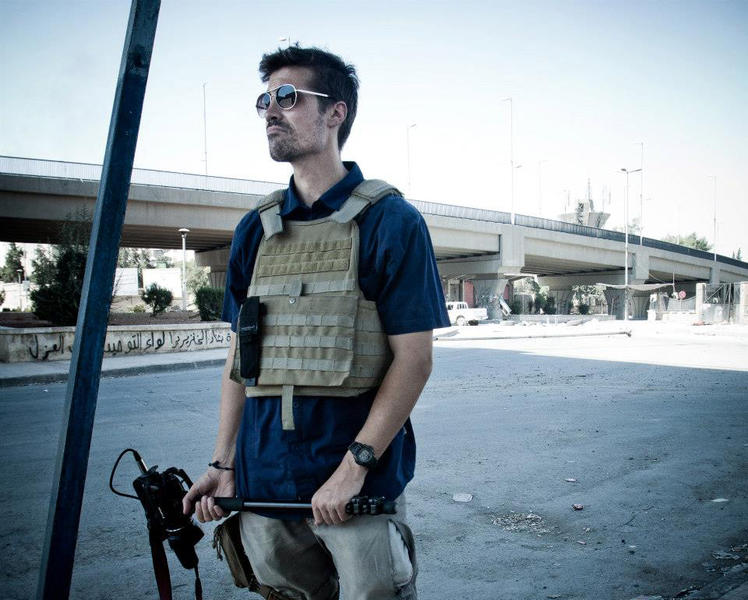The real question James Foley's death poses about America's policy on hostage negotiation


A free daily email with the biggest news stories of the day – and the best features from TheWeek.com
You are now subscribed
Your newsletter sign-up was successful
Five years ago, journalist David Rohde was abducted by the Taliban. The U.S. government refused to negotiate or pay a ransom for Rohde's freedom. But the veteran journalist was lucky. After more than seven months of captivity in the mountains of Afghanistan and Pakistan, Rohde escaped with the help of an Afghan journalist who was abducted with him.
James Foley, as we now know, was not so lucky. The Islamic State of Iraq and Syria reportedly demanded $132 million from Foley's family and employer — who were instructed by ISIS to keep quiet about the case. American officials did not negotiate with the captors and Foley was killed.
Rohde argues in a new column that the issue with America's negotiating policy goes deeper. While the U.S. refuses to pay ransoms, European countries are forking over the huge sums in exchange for their countrymen. Just this past spring, four French and two Spanish journalists held hostage by ISIS were freed after their countries paid ransoms through intermediaries. Rohde writes:
The Week
Escape your echo chamber. Get the facts behind the news, plus analysis from multiple perspectives.

Sign up for The Week's Free Newsletters
From our morning news briefing to a weekly Good News Newsletter, get the best of The Week delivered directly to your inbox.
From our morning news briefing to a weekly Good News Newsletter, get the best of The Week delivered directly to your inbox.
Last month, a New York Times investigation found that al Qaeda and its direct affiliates had received at least $125 million in revenue from kidnappings since 2008 — primarily from European governments. In the last year alone, they received $66 million. [Reuters]
The U.S. cannot allow terrorists groups to control its foreign policy, Rohde writes. But it cannot stand alone against captors while the rest of the world encourages this grim pattern to continue. There needs to be a debate to reach a united, global front.
The payment of ransoms and abduction of foreigners must emerge from the shadows. It must be publicly debated. American and European policymakers should be forced to answer for their actions… A consistent response to kidnapping by the U.S. and Europe is desperately needed. The current haphazard approach is failing. [Reuters]
Read Rohde's full column at Reuters.
A free daily email with the biggest news stories of the day – and the best features from TheWeek.com
Lauren Hansen produces The Week’s podcasts and videos and edits the photo blog, Captured. She also manages the production of the magazine's iPad app. A graduate of Kenyon College and Northwestern University, she previously worked at the BBC and Frontline. She knows a thing or two about pretty pictures and cute puppies, both of which she tweets about @mylaurenhansen.
-
 The ‘ravenous’ demand for Cornish minerals
The ‘ravenous’ demand for Cornish mineralsUnder the Radar Growing need for critical minerals to power tech has intensified ‘appetite’ for lithium, which could be a ‘huge boon’ for local economy
-
 Why are election experts taking Trump’s midterm threats seriously?
Why are election experts taking Trump’s midterm threats seriously?IN THE SPOTLIGHT As the president muses about polling place deployments and a centralized electoral system aimed at one-party control, lawmakers are taking this administration at its word
-
 ‘Restaurateurs have become millionaires’
‘Restaurateurs have become millionaires’Instant Opinion Opinion, comment and editorials of the day
-
 Nobody seems surprised Wagner's Prigozhin died under suspicious circumstances
Nobody seems surprised Wagner's Prigozhin died under suspicious circumstancesSpeed Read
-
 Western mountain climbers allegedly left Pakistani porter to die on K2
Western mountain climbers allegedly left Pakistani porter to die on K2Speed Read
-
 'Circular saw blades' divide controversial Rio Grande buoys installed by Texas governor
'Circular saw blades' divide controversial Rio Grande buoys installed by Texas governorSpeed Read
-
 Los Angeles city workers stage 1-day walkout over labor conditions
Los Angeles city workers stage 1-day walkout over labor conditionsSpeed Read
-
 Mega Millions jackpot climbs to an estimated $1.55 billion
Mega Millions jackpot climbs to an estimated $1.55 billionSpeed Read
-
 Bangladesh dealing with worst dengue fever outbreak on record
Bangladesh dealing with worst dengue fever outbreak on recordSpeed Read
-
 Glacial outburst flooding in Juneau destroys homes
Glacial outburst flooding in Juneau destroys homesSpeed Read
-
 Scotland seeking 'monster hunters' to search for fabled Loch Ness creature
Scotland seeking 'monster hunters' to search for fabled Loch Ness creatureSpeed Read
